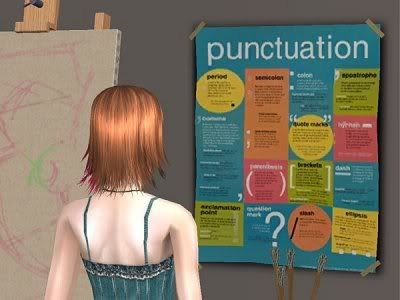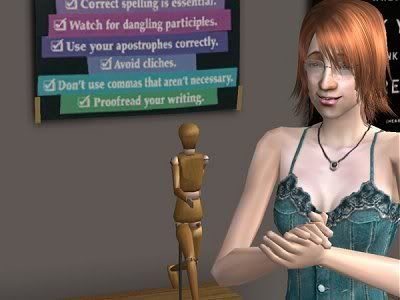
Punctuation is not just for Grammar Nazis to pick at. Punctuation's objective is, and has always been, to make it easier to understand the story. After all, if the reader can't translate the prose, what's the point of writing it?
Beth's Very Easy Punctuation Guide.
- Start all sentences with a capital letter.
- End them with a full stop/period or a question mark.
- Resist exclamation marks. Make your prose stronger instead. Then when you do eventually use one, it'll be more effective!
- Feel free to break these rules, but only when you know how to use them, because once you do know, you probably won't break them.
Quotation marks and dialogue.
You put quotation marks around speech. You can use either " or ', it doesn't matter which, so long as you're consistent about it. If you're cutting and pasting your story from a Word file (a good idea), avoid so-called MS-Word "smart quotes" (quotation marks that lean into the words) because they can code online for some people as weird #&co symbols instead.
Punctuation within dialogue goes inside the quotation marks.
"This is incorrect", she said.
"This, however, is correct," he replied.
"Is this correct, too?" he wondered. [note: no capitalisation on "he" as the sentence didn't finish with "too?", but with "wondered".]
"You betcha, Billy."
Quoting within dialogue works thus:
"'A rose by any other name smells as sweet'."
Or,
'"A rose by any other name smells as sweet".',
depending on which marks you're using for speech. Note the full stop.
Plurals and apostrophes.

Apostrophes (') are used for two (valid) reasons only:
- To replace a letter in a word thus: "can not" becomes can't -- the apostrophe replaces the "no" in "not". These are called "contractions".
- To denote ownership, ie "Bethgael's Tutorial" (the tutorial by Bethgael) or "Reno's bottom" (the bottom belonging to Reno. Huhmmmm. Sorry. I was a wee bit distracted, there).
If the ownership goes to more than one (plural) or someone ending in "s" then you put the apostrophe after the s. So, "in one week's time", but, "in two weeks' time," and also, "Bess' dress" (pronounced Bess-es dress).
Rule 1 over-rules rule 2 (see "it's" later).
It should be noted, just fyi, that "Bethgael's insane" is not "the insanity owned by Bethgael" but a contraction of "Bethgael is insane" (the apostrophe replaces the i in "is"). Whether Bethgael actually owns her insanity is a psychological question, not a grammatical one.
The plural of "cat" is "cats" NOT "cat's". The plural of "rose" is "roses" not "rose's". The plural of "boss" is "bosses" not "bosse's". I am not sure how this became common usage but I suspect supermarket pricing placards are to blame.
Apostrophes are never used as a plural form.
Never.
There are no exceptions.
None.
Not even one.
So stop it.
Apostrophes should also never, ever, ever again on anyone's green earth be used for any form of elven or fantasy name unless there's a damned good reason for it.
Back
Next - Commonly Misused Words
Comment on this tutorial
Story Links
Home




